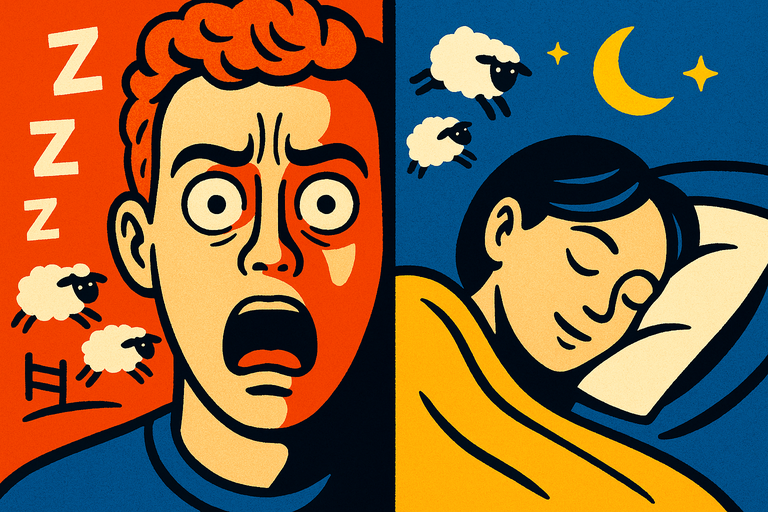- Posted on

Ever fallen for a viral sleep tip—only to realize your nights stayed just as restless?
Picture this: It's two in the morning, and you're scrolling your phone (yes, I know, blue light alert!) searching for that one magical hack to finally shut your brain off. Suddenly, you spot an article promising "one weird trick" to cure your insomnia. Sounds tempting, right?
But here's the kicker—we live in an era where even the so-called experts aren’t immune to misinformation. Just look at the recent bombshell from Gizmodo: ‘RFK Jr.’s ‘Make America Healthy Again’ Report Cites Fake Studies’. The headlines were wild: claims, "studies," and advice with all the authority of a late-night infomercial. It's a wakeup call: How can we separate fact from fiction in our quest for better sleep?
Well, you’re about to find out. Let’s bust the most common sleep myths, explain what the science actually says—and share a few trustworthy tips that’ll help you sleep like you’ve always dreamed.
1. Myth: "Everyone Needs 8 Hours of Sleep—Period."
Raise your hand if you’ve ever obsessed over that perfect 8-hour number. The truth? While 7-9 hours is the general recommendation, everyone’s magic number is a little different. Your age, genetics, and daily activity play a huge role.
How to find your sweet spot: - Track how you feel after different amounts of sleep. - Don’t ignore your natural rhythms—some folks are night owls, others are early birds. - Consistency beats perfection. (Don’t sweat the occasional late night, just get back on track.)
2. Myth: "Snoring Is Harmless (Just Annoying)."
Okay, confession: I used to think snoring was just a silly quirk. Then my partner gently (okay, not-so-gently) pointed out I sounded like a chainsaw. But here’s what many people don’t realize: chronic snoring can be a red flag for deeper sleep issues, including sleep apnea.
You don’t have to suffer through another night or risk your health. These days, companies like Snorple have developed customizable solutions that combine the latest science and smart design, helping you (and your bed buddy) breathe easy and wake refreshed. Their unique mouthpiece, for example, isn’t just latex-free and hypoallergenic, but also uses both jaw-advancing and tongue-stabilizing features—proving sleep science is advancing faster than ever.
3. Myth: "You Can 'Catch Up' on Sleep on the Weekend."
Don’t we all wish this was true? Pulling an all-nighter, then clocking 12 hours on Saturday sounds like balance, right? But your body’s internal clock (circadian rhythm) doesn’t reset quite so easily.
Instead: - Keep your weekday and weekend bedtimes within an hour of each other. - Focus on regular, quality sleep, not dramatic catch-up sessions. - If you’re exhausted, a 20-minute power nap beats a marathon snooze fest any day!
4. Myth: "Alcohol Helps You Sleep Better."
Nightcap, anyone? Turns out, those sleepy feelings from alcohol are misleading. While you might doze off quicker, the quality of your sleep plummets, leading to more nighttime wake-ups and less restorative rest.
Swap that nightcap for: - Calming herbal tea - Breathing exercises - A relaxing bedtime playlist
5. Myth: "Sleep Gadgets Are Just Gimmicks."
I get it—there are a LOT of wild sleep products out there promising miracles. But tech can actually help… if you pick wisely and back it up with science.
What to look for: - Customization (like Snorple’s boil-and-bite mouthpiece for a personal fit) - Materials that are safe and hypoallergenic - Real user testimonials and independent reviews
Trust your sleep to brands that care about real results and back their claims with research—not just clever marketing.
The Takeaway: Choose Science, Not Hype
After the mess outlined in that Gizmodo article, it’s more important than ever to double-check the sources behind the advice you follow. Whether it’s a viral sleep tip, a politician’s promise, or a new sleep gadget, look for:
- Evidence-based claims
- Transparent customer feedback
- A money-back guarantee (psst: Snorple offers one!)
Your sleep is too important to leave to chance or clickbait.
So, here’s my challenge to you: The next time you see a sensational sleep hack, pause and ask, “Is this science or just spin?” And if you’re searching for reliable solutions, do your homework, explore what’s out there (seriously, check out what real sleep science looks like), and most importantly—listen to your own body.
Ready to bust your own sleep myths? Drop your “too good to be true” stories or your favorite science-backed hacks in the comments! Let’s help each other rest smarter, not harder.